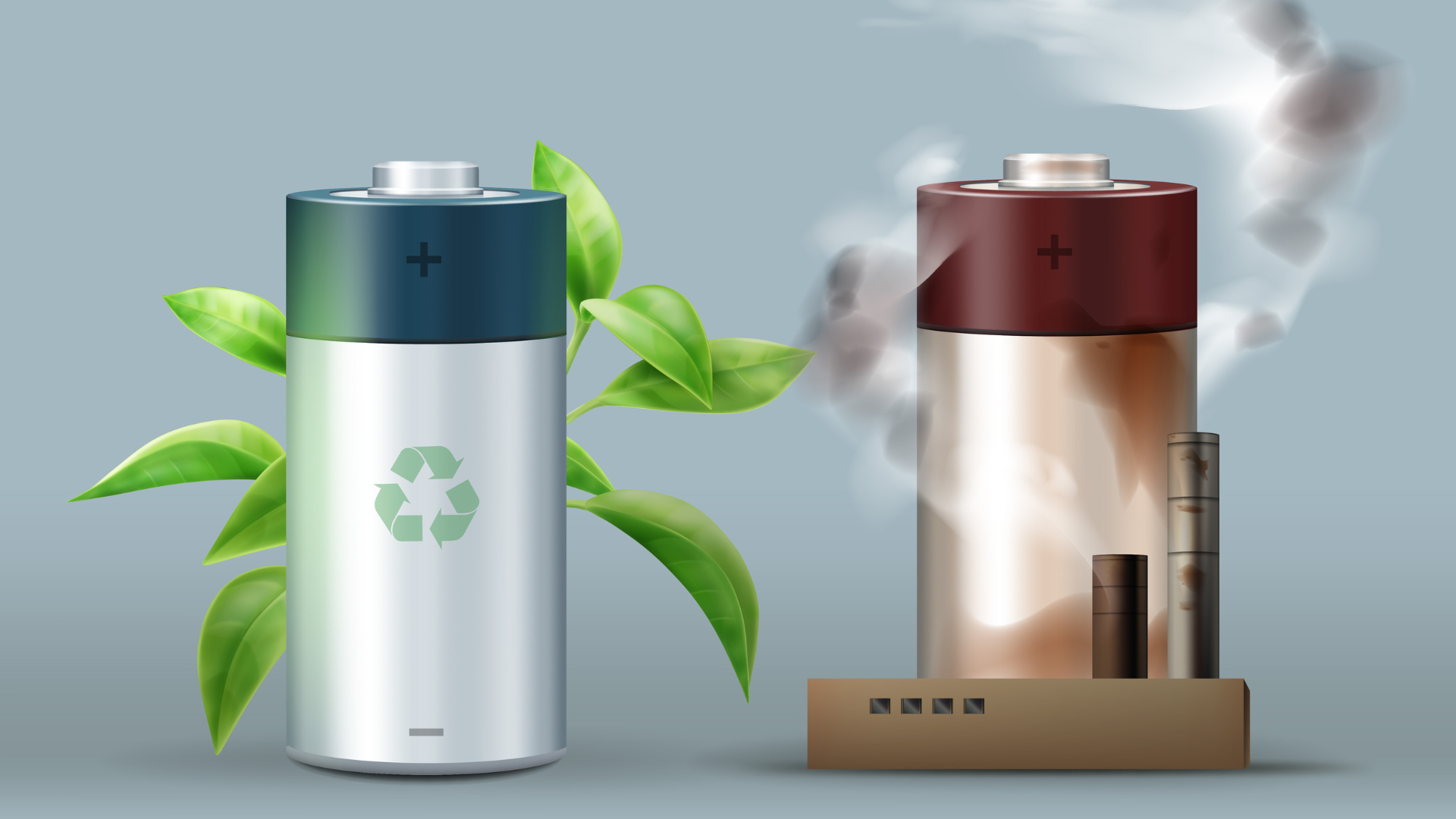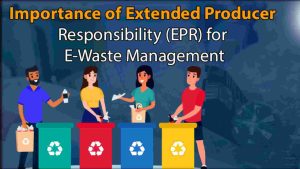![]()
The Significance of Complying with Environmental Regulations and Managing Potential Risks Associated with Lithium-ion Battery Recycling in India
In recent years, the proliferation of lithium-ion batteries has played a pivotal role in creating renewable energy solutions, electric vehicles, and portable electronics. These batteries have become an essential component of the modern world due to their high energy density and efficiency. However, as the adoption of lithium-ion batteries continues to grow, so does the need to address the environmental impact of their disposal and production. In India, a country experiencing rapid industrialisation and urbanisation, the recycling and proper management of lithium-ion batteries are of paramount importance to mitigate potential environmental and health risks. This blog explores the significance of complying with environmental regulations and managing potential risks associated with lithium-ion battery recycling in India. Environmental Compliance in Lithium-ion Battery Recycling in India
I. The Growing Importance of Lithium-ion Batteries in India
Lithium-ion batteries are integral to various sectors in India, including renewable energy, electric vehicles, and consumer electronics. With increased demand for electric vehicles (EVs) and solar power systems, the production and usage of lithium-ion batteries have witnessed a remarkable upswing in the country. The Indian government’s commitment to clean energy and the electrification of transportation further emphasises the role of lithium-ion batteries in the nation’s future.
Renewable Energy Sector
In the need for clean and sustainable energy sources, India has made substantial investments in solar and wind power. Lithium-ion batteries are crucial for energy storage in these renewable systems, ensuring a stable electricity supply even when the wind isn’t blowing or the sun isn’t shining. This application allows India to reduce its dependence on lower greenhouse gas emissions fossil fuels and achieve its ambitious renewable energy targets.
Electric Vehicles (EVs)
Promoting electric mobility is a key policy initiative in India to combat air pollution and reduce the nation’s dependence on imported fossil fuels. The increased adoption of electric vehicles relies on lithium-ion batteries for their performance, range, and efficiency. As a result, the Indian EV market is experiencing rapid growth, with numerous manufacturers producing electric two-wheelers, four-wheelers, and buses.
Consumer Electronics
Lithium-ion batteries are found in various consumer electronics, from smartphones and laptops to power banks and wearables. As India’s middle class expands, consumer demand for these devices is increasing, making lithium-ion batteries an integral part of everyday life.
II. The Environmental Impact of Lithium-ion Batteries
While lithium-ion batteries offer many advantages, they also come with environmental challenges that must be addressed responsibly. The production, usage, and disposal of these batteries can have significant ecological impacts, making it imperative to comply with environmental regulations and manage potential risks associated with recycling.
Resource Extraction and Mining
The raw materials needed for lithium-ion batteries (LIB), such as lithium, cobalt, and nickel, are often extracted through mining operations. These mining processes can harm the environment, including deforestation, soil and water pollution, and habitat destruction. In regions where these resources are abundant, ensuring responsible mining practices is crucial.
Energy Consumption
The production of lithium-ion batteries involves energy-intensive processes, contributing to greenhouse gas emissions. These emissions can counteract the environmental benefits of using lithium-ion batteries in electric vehicles and renewable energy systems. Consequently, the reduction of energy consumption and the utilisation of clean energy sources in battery manufacturing are essential to mitigate environmental impact.
End-of-Life Management
As lithium-ion batteries reach the end of their operational life, they become electronic waste (e-waste). Improper disposal and recycling of e-waste may result in toxic chemical leaching, soil contamination, and air pollution. Inadequate e-waste management can harm human health and the environment, emphasising the need for effective recycling and disposal strategies.
III. Environmental Regulations in India
India has recognised the importance of environmental regulations and standards to address the environmental impact of lithium-ion batteries. The government has introduced several initiatives to govern the production, import, and recycling of batteries to ensure compliance with environmental standards.
Battery Waste Management Rules
The Ministry of Environment, Forest, & Climate Change or MoEF&CC in India introduced the Battery Waste Management Rules in 2001. These regulations aim to manage the disposal of lead-acid batteries and protect the environment from their hazardous components. The rules require establishing collection centres, authorised recyclers, and environmentally sound disposal facilities.
E-waste Management Rules
The E-waste Management Rules, implemented in 2016, provide a comprehensive framework for the environmentally sound management of all types of e-waste, including lithium-ion batteries. These rules mandate extended producer responsibility (EPR) for producers of electronic and electrical equipment, encouraging them to take back and recycle their products at the end of their life.
Bureau of Indian Standards (BIS)
The Bureau of Indian Standards or BIS is liable for developing and maintaining quality standards in India. It has introduced standards for lithium-ion batteries to ensure their safety and performance. Adherence to these standards is essential to prevent incidents of battery fires or explosions, which can have severe environmental and safety consequences.
IV. Risks Associated with Lithium-ion Battery Recycling
Recycling lithium-ion batteries is a complex process that involves several potential risks if not managed properly. To guarantee the safe and sustainable recycling of these batteries in India, these risks must be addressed.
Chemical Hazards
Lithium-ion batteries contain hazardous materials, including lithium, cobalt, and nickel. Improper handling of these chemicals during recycling can lead to chemical exposure, contamination of water sources, and air pollution. It is crucial to have trained personnel and well-equipped facilities to manage these hazards effectively.
Fire and Thermal Runaway
Lithium-ion batteries are susceptible to thermal runaway, a chain reaction resulting in fires and explosions. During recycling, if batteries are damaged or mishandled, they can pose a significant fire risk. Safety measures, such as fire-resistant storage and equipment, are necessary to prevent accidents.
Battery Transport
The transportation of lithium-ion batteries, significantly damaged or defective ones presents a risk. Accidents during transportation can result in chemical spills, fires, and other environmental hazards. Strict regulations and training for those involved in battery transportation are essential to mitigate these risks.
Waste Management
Disposing of non-recyclable battery components can lead to environmental contamination if not managed correctly. India must invest in environmentally sound disposal facilities and encourage manufacturers to develop batteries with fewer toxic components.
V. Best Practices for Lithium-ion Battery Recycling
To ensure responsible and sustainable lithium-ion battery recycling in India, several best practices can be implemented:
Adequate Training
Workers involved in battery recycling should receive proper training on handling hazardous materials, equipment operation, and safety protocols. This training is crucial to minimise chemical exposure and the risk of accidents.
Advanced Recycling Technologies
Investing in advanced recycling technologies can improve the efficiency and safety of the recycling process. Innovative methods, such as hydrometallurgical and pyrometallurgical processes, can help recover valuable materials from spent batteries while minimising environmental impact.
Extended Producer Responsibility (EPR)
Extending producer responsibility ensures that battery manufacturers take responsibility for the recycling and collection of their products at the end of their life cycle. This practice encourages manufacturers to design easier batteries to recycle and recover materials.
Efficient Transportation
Strict regulations and guidelines for the transportation of lithium-ion batteries should be in place to prevent accidents and environmental contamination. This includes proper packaging, labelling, and the use of specialised vehicles for transporting batteries.
Public Awareness
Educating the public about the importance of recycling lithium-ion batteries and the potential risks of improper disposal is vital. Awareness campaigns can encourage individuals to return their used batteries to collection centres and follow recycling guidelines.
VI. Conclusion
The growing importance of lithium-ion batteries in India, driven by the adopting of electric vehicles and renewable energy solutions, underscores the significance of responsible recycling and waste management. The environmental impact of lithium-ion batteries, from resource extraction to disposal, cannot be ignored. Compliance with environmental regulations and implementing best practices for recycling are essential to mitigate potential risks.
India has taken significant steps in regulating the recycling of lithium-ion batteries and managing e-waste through the Battery Waste Management Rules, E-Waste Management Rules, and quality standards established by the Bureau of Indian Standards. However, continuous monitoring and improvement of these regulations and practices are necessary to ensure that the environmental impact is minimised.
Lithium-ion batteries are a critical component of India’s sustainable future, but their environmental implications must be addressed with diligence and responsibility. By complying with regulations, managing potential risks, and promoting responsible recycling, India can harness the benefits of this technology while minimising its ecological footprint.





